Scribe Meets World is back! (And a little miffed that Bridesmaids, last year’s R-rated comedy blockbuster, didn’t win an Oscar for Best Original Screenplay.) I mean, really. Woody Allen’s already accumulated enough golden statues.
I never planned on watching Bridesmaids. I’m not actually one for crude humor. But I have to admit, I was intrigued. The gross-out comedy grossed $169 million (domestic), which was completely unexpected. Hollywood insider Nikke Finke was so convinced Bridesmaids would be a box office bomb, she even promised to stop reporting on the box office altogether if the movie made more than $20 million. Well, for all of us who like to read her slightly snarky scoops, thankfully she was granted reprieve from Universal Pictures.
After reading about the hoopla on Deadline Hollywood, when the Bridesmaids DVD went on sale, I thought, okay, I’ll give it a try. Plus, I had your interests in mind too—I thought watching such a successful comedy might yield some screenwriting tips.
Turns out, it was a good decision for both of us. Bridesmaids, starring Kristen Wiig as Annie, an inept Maid of Honor for the wedding of her best friend, Lillian, played by Maya Rudolph, was a lot funnier than I had expected. I laughed more during it than any other comedy I had seen in 2011 (or 2010). Plus, I did learn a lot of comedy script tips by watching it. Don’t worry, they’re not raunchy. You can apply them to comedies of all types, not just the R-rated ones.
So onto the comedy writing tips I learned by analyzing Bridesmaids:
Comedy Screenwriting Tip #1: As always, the key to comedy lies in reversals
Reversals are the linchpin of any comedy. I’ll be a little pretentious here and quote myself from this post I wrote on The Hangover:
All comedy is based on reversals: taking audience expectations and subverting them.
As a comedy which was actually funny, Bridesmaids was chock full of reversals, which wreaked havoc with audience expectations. A few of these include:
- Instead of being respectful to their stepmother, Helen’s stepkids are vicious to her, even when she’s being nauseatingly sweet to them
- Megan is the kind of girl who marches to her own beat, so when she asserts that the plane passenger next to her is an Air Marshall, we’re skeptical…but in a reversal of our assumptions, it turns out he really IS an Air Marshall
- A bridal shower is supposed to be a fussy affair which pampers the bride. But some of the bridesmaids’ suggestions are anything but. Becca’s idea of a Pixar-themed shower is more suitable for a child’s birthday party, while Megan’s suggestion to throw a Fight Club-style party is even more outlandish. “Then we beat her up—Lillian won’t expect that!”
- Instead of hawking jewelry faster than you can say “commission,” Annie drives customers away. She tells one Asian couple looking for an engagement ring that although they think now that their love will last forever, it won’t, ‘cause you can’t trust anyone. (She also questions whether the Asian guy is really Asian). Later, Annie tells a tween hoping to buy a BFF necklace that the girl and her bestie won’t be best friends forever. The tween doesn’t run away crying but instead challenges Annie right back in a hilarious verbal duel which ends when Annie takes her insults one step too far.
- Towards the end of the movie, Annie actively tries to get a ticket from Officer Rhodes—well, she’s more after his attention, but still most drivers don’t text, litter, drink, or go topless in front of a cop. They don’t rear-end police cars either.
- Finally, the grand poobah of reversals and probably the scene most people remember from the movie, is when the bridesmaids all get food poisoning at a fancy dress shop. It’s disgusting, true. But the contrast between such earthy bodily functions and the swanky elegance of the dress shop is what great reversals are made of.
Nailing down reversals is essential to writing a good comedy screenplay. So if you want more examples, check out screenwriting tip #1 from How to Write a Comedy Script: Lessons from The Hangover.
Comedy Screenwriting Tip #2: Competitions are funny
If you’re struggling for ways to increase the humor in your comedy screenplay, try adding a scene where two of your characters compete for something really ridiculous. Having your characters try to outdo the other can lend itself to endless gags, either physical or verbal. In Bridesmaids, there was a huge competition between Annie and Helen, which fueled the plot of the entire movie. Many of the jokes in Bridesmaids arose out of that competition…but that’s much larger in scope than what I’m talking about in this comedy writing tip.
What I’m suggesting is smaller in scale, and is designed to liven up what I think of as “interstitial scenes,” the brief ones which usually are there to quickly reveal character or to set up longer scenes later in the movie. Interstitial scenes are essential if you want your screenplay to make sense, but a lot of times they can be boring to read.
One way to jazz them up is to add a dash of competition. For example, in Bridesmaids, screenwriters Annie Mumolo and Kristen Wiig spent time showing how pretty much everything in Annie’s life, except for her friendship with Lillian, was a mess. One of those messes was her job at a jewelry store, where she basically drives customers away.
Her boss asks Kahlua, another saleswoman, to come to Annie’s counter and demonstrate Kahlua’s “love is eternal face.” Kahlua does so (looking beautiful but a bit vacuous if you ask me). Then Annie tries to imitate Kahlua, to prove she’s just as good as her. (She loses this battle though, as her boss says Annie looks like she’s got menstrual cramps.)
When you’re writing your own comedy screenplay, and you feel that a scene is flat, let everyone’s competitive streak rise to the surface…and see what happens. The more absurd, specifically ridiculous issue they compete over, the funnier it can be.
Comedy Screenwriting Tip #3: Escalation is your friend
Your movie isn’t a warzone, which means that escalation is a good thing. Over all, in your screenplay, everything should get “bigger.” The obstacles should be become more difficult, the action sequences more elaborate…the comedy set pieces more funny.
Because of the principle of escalation, the biggest set pieces in your comedy screenplay should be reserved for the second half of the movie. This is primarily due to audience expectations. If audiences experience the funniest comedy scenes at the film’s start, they’ll think the movie went downhill after the first act. As much as they may have laughed during the beginning , they’ll leave the theater feeling dissatisfied.
Comedy screenwriters can also use the principle of escalation within a comic set piece. As the degree of absurdity increases, so too should the audience’s laughter. In five minutes, they can go from chuckling to gut-toning guffawing.
The toast comic set piece in Bridesmaids is a perfect example of this. Length is the first element Annie and Helen compete in: Helen gives a longer toast than Annie, so Annie rushes up to the microphone to give a lengthier second toast. Not one to be outdone, Helen reclaims the microphone and toasts Lil using a beautiful Thai expression…in Thai.
Annie rallies with her own toast, a random assortment of phrases she remembers from high school Spanish. This duel of foreign languages is pretty ridiculous, but the toasting completion goes to an even more absurd level when Annie and Helen sing–in their best imitation of Celine Dion.
When you’re planning out your own comedy set pieces, see if you can start with “small” joke, and then build on it, by increasing the absurdity level, to create a bigger one. A lot of writers think that you’re born with the funny gene, but I think you can develop an eye (and ear) for humor.
The principle of escalation is great to experiment with, so brainstorm all the ideas you can, identify the best ones, and then organize them into a humor sequence which gets progressively more absurd. The more you engage in this process, the more easily comedy sequences will come to you.
Comedy Screenwriting Tip #4: Create Quick Verbal Gags with the Principle of Three
The principle of three is a comedy staple. Billy Mernit, story analyst for Universal Pictures, and author of the enormously helpful Writing the Romantic Comedy describes the principle of three thus so:
A kangaroo walks into a bar and orders a drink; he does it again; on his third visit, the punch line is delivered. Why? Simple. The first instance is random. It’s only part of the a setup. The second time establishes a pattern. Now we’re truly set up, with expectations in place. The third time is the payoff. (1) No pattern is evident; (2) sequence is established; (3) a twist occurs. Comedic movie sequences are often built on interlocking versions of this structure.
While not the same method of action which Mernit describes, the principle of three can also help you create quick verbal gags. Basically, one of your characters can list three items, one of which doesn’t belong. This random element is what creates the humor. For example, in Bridesmaids, Annie has two roommates, a creepy sibling duo. In one scene, the brother lists offenses that he and his sister have committed against Annie.
He tells her, “you should have a sign on your door which says do not come into my room, ready my diary, or wear my clothes.” The third one is particularly funny because we didn’t know about it (neither did Annie), and so the surprise factor gives the last list element an added jolt of humor.
Comedy Screenwriting Tip #5: Humor is based in reality
Jokes don’t exist in a vacuum. In order to make someone laugh, something inside of him or her has to resonate with your comedy routine or slapstick bit. This resonance usually occurs when your audience connects to a kernel of truth, however tiny it may be, that resides at the heart of your joke. In most cases, I think that the larger the kernel of truth is, the deeper the laugh.
The beginning of Bridesmaids demonstrates this point perfectly. In the first few scenes, we see Annie sneaking into her semi-boyfriend’s bathroom, applying makeup, creeping back into bed, and arranging her body and facial expression to make it appear to Ted, the jerk beside her, that she wakes up naturally looking so perfect. The scene is a lot funnier on screen than on the page especially because Kristen Wiig is very adept at physical comedy.
But even if she weren’t such a great comic actress, the scene would have been funny because of the kernel of truth behind it: every girl except for Angelina Jolie looks like rubbish in the morning but likes to pretend otherwise…especially at the beginning of relationships. (Of course in Annie’s case there is no relationship, but you get the point.)
Despite grooming herself to perfection, Annie is chucked out of Ted’s house. Annie rushes outside–only to find that the gate to Ted’s house is locked. Because she’s hurt and embarrassed, she doesn’t want to call him on the intercom to ask him to unlock it. Instead, she climbs on top of the gate…only to discover it swinging open to allow Ted’s cleaning lady to enter.
It’s a hilarious moment, and not just because Annie looks like she’s a bucking a security gate instead of a bronco. The real humor comes from the audience connecting to Annie’s walk of shame, since they’ve shared a similar experience or know a friend who has. The walk of shame is a joke with universal appeal, and in Bridesmaids, it was expressed in a unique, fresh manner…which is one of the many reasons of its juggernaut success.
Final Thoughts on Bridesmaids
Bridesmaids was a hugely successful comedy, not because of its gross-out gags or because Kristen Wiig is enormously adept at making comical expressions. The movie made millions, because it had something I’ve been praising for a while. Something which contributed to the success of Back to the Future and Sherlock Holmes.
Something called heart.
In addition to (or maybe in spite of) raunchy humor, Bridesmaids had a lot of authentic emotion behind its story world. At its core, Bridesmaids was about Annie and Lillian’s friendship, and Annie’s fear of losing her best friend to marriage.
It was also about Annie’s own personal transformation, from a girl who became defeated by life’s setbacks to a girl who “fought back” when life was bringing her down. Let’s also not forget the romantic relationship between Annie and Officer Rhodes. That storyline had not only chemistry, but also a genuineness to it which is lacking in so many Hollywood rom-coms.
When you’re trying to create comic set pieces and comedy gags, don’t forget to also spend time developing genuine emotional connections between your characters because the heart of the story is what makes people flock to a movie theater.
Being Bridesmaid by Lauren Hammond
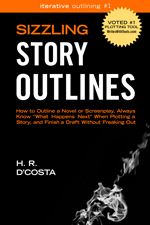










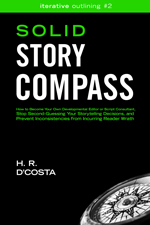
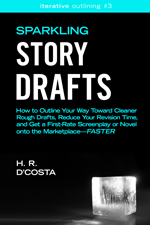
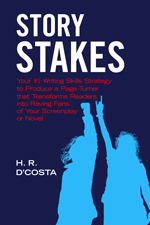
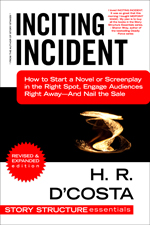
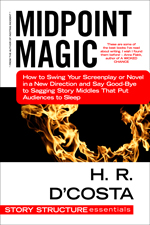


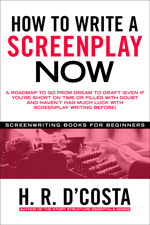
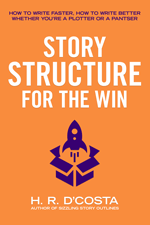

Comments on this entry are closed.
Hey I loved your article. I going to look into getting those books you recommended. Thank you so much.
Hi Porscha,
Glad you enjoyed this analysis on Bridesmaids! Good luck with your own comedy script! Let me know if there are other comedies you’d like to see analyzed on Scribe Meets World.
Sir, your posts are eye openers, and much appreciated. God bless.
Need advice:
Have you had the following experience: Your agent is requested to send a script to the D-guy of an A-list producer. 8 weeks go by no word. Agent calls or eMs ubanswered. Being from Brooklyn, I’d love to bash this jerk’s face in POS who probably never wrote a script. It seems unless u r a freind of the producer, if u script is steered to development, it’s DOA. True or false?
How do u dceal with this?
Sorry re typo “deal” not “dceal”. Didn’t proof it. Lesson herein. Always proof-read or have others with an objective eye do it.
Hi Jon,
I think an agent or manager is the best person to help you with this.
this is a really great article. best i’ve read on this topic. really helpful as a writer.